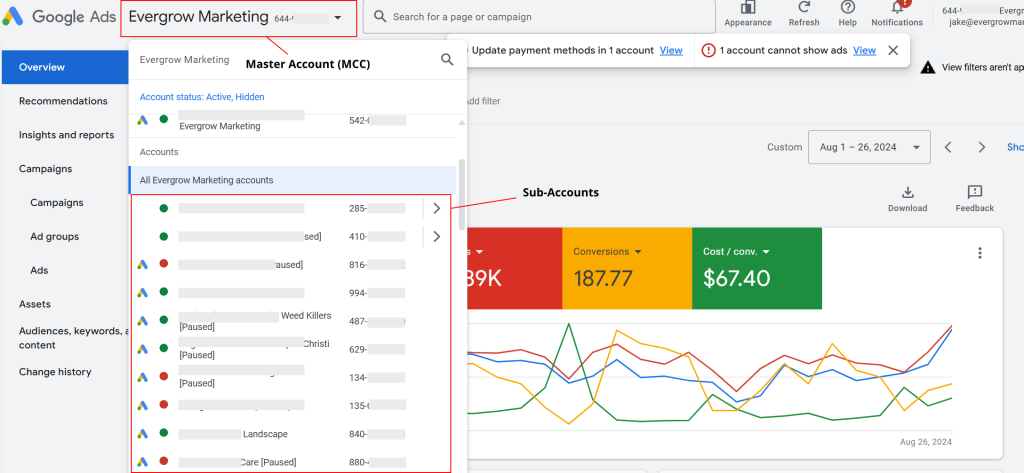When you work with Evergrow, we help you claim ownership of all your Google properties. That includes Google Analytics, Search Console, and Tag Manager. These are your assets. If we claim them, you’ll own them.
But there is one asset type we create and maintain ownership of and that is ad accounts.
It’s our biggest pushback with clients. Typically, agencies work in existing client ad accounts versus creating completely new ones.
We have many reasons why we maintain ownership of these accounts. They range from our own process scalability to actual legal implications.
It would be good to weigh out the reasons why you might want to maintain ownership versus your agency.
Why You Should Own Your Account
For starters, any ad account you created in the past will remain yours. We generally don’t request access to these. Ad accounts we create are completely new and any number of ad accounts can exist at one time for a website.
But here are a few reasons why you might only want to work out of your existing ad account.
You Want to Keep Your Data
If you run ads in your account and then an agency creates a new account to run ads, there will be a gap in the historical data.
Let’s say you ran your own ads for one year and then had an agency run ads in their account for a year. After that, you part with them and continue running ads in your own ad account. There will now be a year-long gap after that first year when your old agency was running its ads.
You won’t have exact year-over-year data. You also can’t compare your performance with your agency’s performance. At least not within the Google Ads platforms.
You could still pull those numbers if your agency provided you with reports during that year. It’s just a bit more manual work.
You Want Ad Spend Rewards (Credit Cards)
We see this one a lot.
Most businesses today use credit cards for their rewards. Ad platforms like Google and Facebook don’t charge credit card processing fees. You get free credit card rewards points with no processing fees. As long as you pay it off before the billing cycle ends.
If your agency owns the ad account, their card is in the account while they invoice you for the ad spend. If you pay your agency via ACH or check, you’re missing out on those credit card points.
You Want to Edit Your Campaigns
If you love making your own tweaks to your ad campaigns, then you’re going to want to own the account.
On the flip side of this, if you want to make changes to your ads while you’re paying an agency to manage them… why are you paying them?
Why We Choose to Own Ad Accounts
Again, we’re not owning your ad account. We’re creating and maintaining ownership of our ad account.
During the relationship, you do get viewer access to the account. You can even rebuild our entire structure in your ad account or download all our keywords.
We even tell you for free how we build ad accounts: Google Ads Campaigns for Landscaping & Lawn Care.
These are the main reasons why we want to maintain ownership of the ad properties we create.
Consequences of Human Error
Human error happens in every industry.
In yours, it’s weed whipping too close to a rock bed. It’s using glysophate instead of acetic acid on lawn weeds. It’s also hitting sprinkler lines when trenching French drains.
In ours, it’s adding one too many zeroes at the end of a daily budget or forgetting the decimal. $33.00 per day becomes $3,300 per day. A $1,000 monthly budget turns into a $100,000 monthly budget.
The responsibility for the error is based on whose payment details are in the profiles.
Legal Consequences
In a legal sense, Google doesn’t care if you made a spending error in the ad account. If they delivered the ads and you got the clicks, they are billing the payment information in the ad account.
If your payment information is in the ad account, you are responsible for paying that. If your agency isn’t willing to reconcile or is unable to, it’ll have to go to court.
If your agency’s card was in the ad account, your agency is directly responsible for the spend — which they should be. If they’re spending money on your behalf, they’re effectively financial advisors.
Insurance logistics
If an error like this occurred, the agency would want to use its Errors and Omissions insurance. As we all know, insurance claims can be a lengthy process.
If an agency grossly overspends and needs to file an insurance claim, the only party affected by this negatively is the agency. The spend is tied up in the agency’s credit card or in their accounts payable. Not yours.
Let’s look at the flip side of this. What if you maintained ownership of your account and the agency made the $1,000 to $100,000 gross overspend error? The difference here is a decimal.
If the agency admits fault and opts to file a claim under Errors and Omissions, it’s your money that’s tied up. Your credit card is maxed out and your credit is affected while the claim is being resolved.
It’s in the best financial interest of our clients for us to take full responsibility for ad spend.
Data Aggregation
We run successful Google Ads for Landscapers. And it doesn’t take us months to optimize.
We’ve aggregated data from all current and past accounts we’ve built and have access to. If we were removed from ad accounts after relationships, we would have less data to reference.
This allows us to create reports like this every year:
Clients churn for many reasons. With us, it’s mostly due to mergers and acquisitions or too many inquiries to handle. In other cases, it’s simply wanting to dip their toes into other agency waters.
Those clients leave and a new client comes on board. When they’re in the same service area, we know exactly what did and didn’t work. We have the data we have saved and can reference.
Scalability & Client Success
Receiving access to existing ad accounts comes with its own challenges. Every account is different and requires different levels of attention (or rebuilding).
Managing Multiple Ad Accounts
For our internal processes, we have created template ad accounts and campaigns. These have proven track records of success in every green industry. We have templates from tree care to fertilization and weed control.
From scratch, we can copy the winning accounts over into campaigns we create for new clients. Our team will know all account settings and immediately which levers to pull.
Working with existing accounts adds a new layer of complexity. It also results in troubleshooting when things aren’t performing as expected.
When we build ad accounts to our standard, we mitigate the amount of variables in ad performance.
Duplicating Success
There’s another benefit to having access to all past and present ad accounts. We’re able to take successful implementations of one ad test and blast it out to all other clients.
In short, you benefit from other clients spending their own money on their own campaigns.
Part of this success duplication is the use of account-level negative keyword lists. We structure our client accounts under a Google Ads Manager Account. This is called an MCC (My Client Center).
It looks like this:

When we do this, we can apply master negative keyword lists across all accounts. When keywords pop up in multiple ad accounts, we add them to the master list.
An example of this is when we target “lawn mowing near me” and Google decides to show our ad for “lawn mower near me”. Although, very similar in wording, very different in meaning. This would prompt us to add “mower” as a negative keyword to our master negative keyword list.
That would then apply to all of our subaccounts under our MCC and all clients would benefit from it.
We could add accounts to our MCC that we do not own. However, agencies are frequently never removed. This means they will stay under the MCC. That is another variable entering the consequences of human error.
Risk Mitigation & Account Siloing
People come to us all the time wanting us to run their Google Ads for them. They ask us to build a new ad account because theirs was suspended and they can’t get it appealed. This can be for a lot of reasons.
Perhaps an agency in the past did shady things with their ads. There could be issues on their site that Google is flagging as spammy or misleading. Things like unintended redirects can cause ad accounts to get suspended.
When Google suspends accounts, its algorithm detects other accounts with the same emails. As an agency, we’re tied to a lot of accounts. These suspensions could spread like wildfire.
It’s important for us to control the setup and management of the entire ad account. This way, we know the complete history and we can control ad account suspensions. If an ad account that was created 2 months ago was suspended and we had to start over, we’re only losing 2 months of data. If we take on an account that has 2 years of data and have to start over, that’s a lot of data that can get lost.
Another Thing to Consider
What if we’re not good? What if you give ad account access to an agency and they delete old campaigns and change your keywords? What if they delete all your negative keywords or change your bidding strategies? What if after all that, the whole thing flops?
You’re left with wasted money and a ruined ad account. It was performing better than when you hired them, being stuck to rebuild it yourself.
If the agency built its own ad account, it can preserve your historical performance and setup. All while isolating the success of the agency.
If things turn out great and the agency gives you access to the account, you can duplicate what they set up in your own.
Do we grant you access to the ad account we built for you?
We sure do.


0 Comments